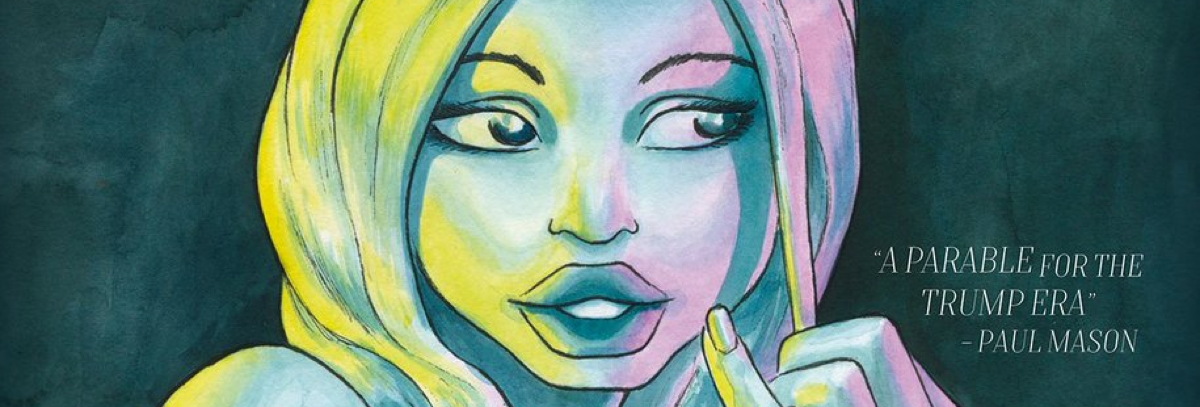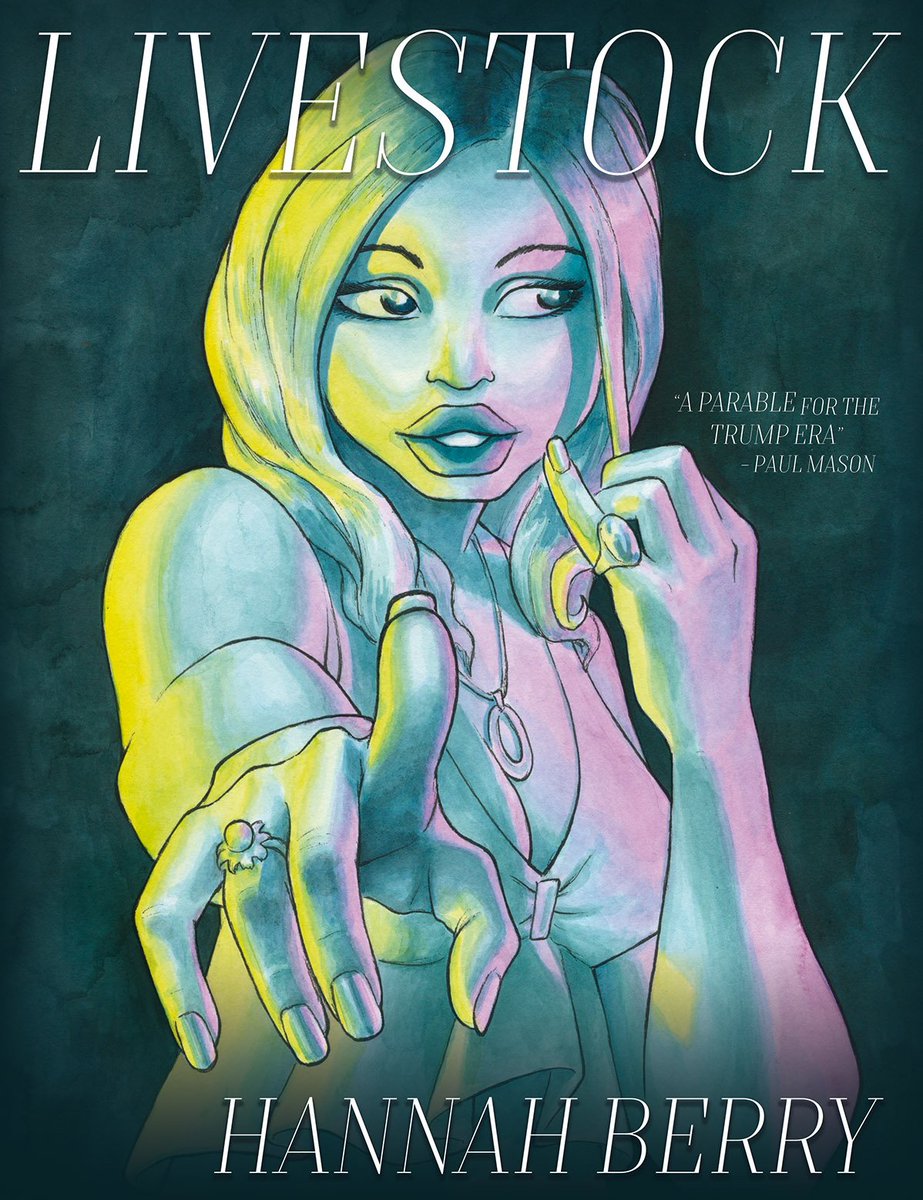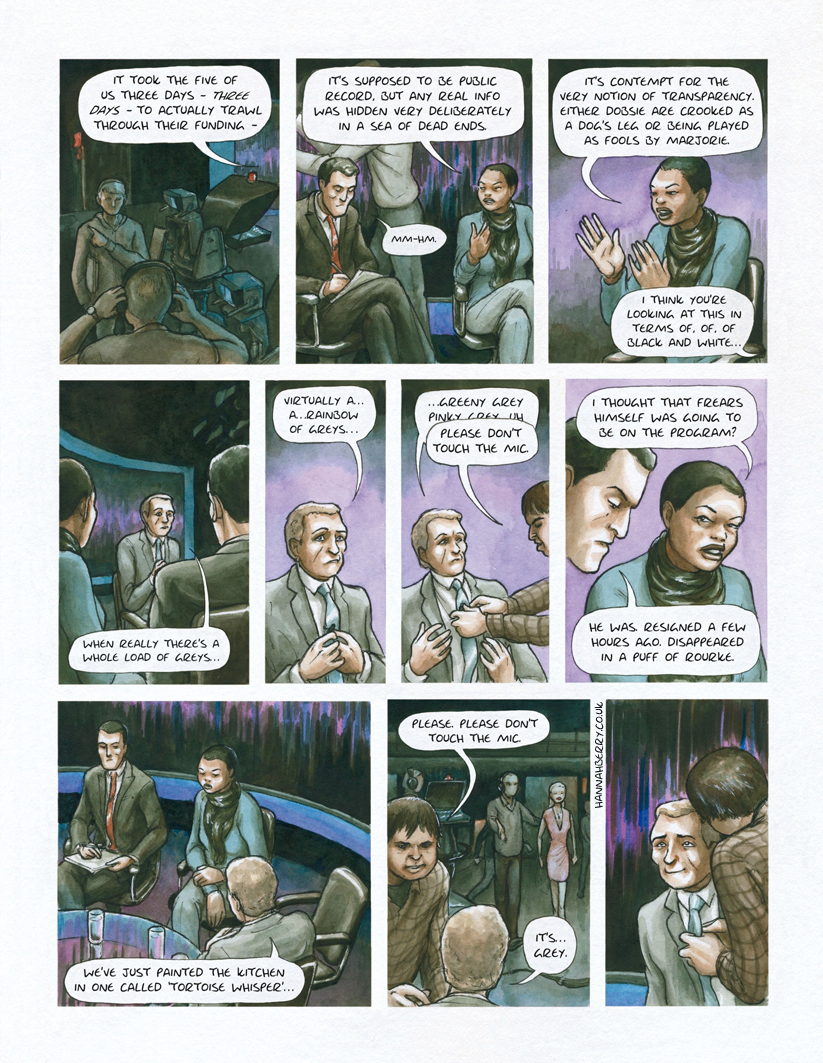Hannah Berry is a UK cartoonist whose 2010 gn Britten & Brülightly was a well-received mystery tale (and an Angoulême prize nominee when it came out) Her new book, Livestock, just out from Jonathan Cape, looks like a sharp satire on celebrity, social media and politics. Sounds like a strong career, right? Jonathan Cape is one of the UK’s most respected publishers so what could go wrong?
Well, in an interview with the comics newsletter Ink , Berry reveals, plenty, mostly due to the Spartan lifestyle her meagre advances led to:
That’s not cheery hyperbole – the idea of stopping because it’s the evening or the weekend is absurd. Bank holidays are just that: holidays for the bank. I work on my birthday. On Christmas day I’ll sneak away from my family to get a couple of hours in. If I’m prised from my desk to go on holiday I’ll bring a script and a pad and get some planning done. When meeting up with friends I’m notoriously late because I’m trying to finish off a page/panel/whatever. I actually lost a really close friend though my inattentiveness, and I’m amazed anyone else still hangs around with me. I’m even more amazed that my partner is still at my side. When the sun is shining and everyone else in Brighton is on the beach, I’ll be at my desk with the window open. It’s a punishing way to live, but I don’t see any alternative. I’ve just become used to it.
Berry gives some grueling personal details on this, and even the numbers: Her advance for Livestock was £10,000 (about $13,000 depending on the exchange rate.) Of that she got £5000 in advance, and she also applied for an Arts Council grant and got another £10,000. Throw in about £9000 in additional freelance income, and it comes to £24,000 over a three year period, or living on about $10,000 a year for three years.
How does she survive? Berry has to rely on what so many other cartoonists do: a partner with a job:
Now, I’m a simple girl with simple needs, and part of my puritanical mania manifests itself in living as cheaply as possible: I’ll wear clothes until they literally fall apart; I brought a hip flask to my BFF’s wedding; my wildest extravagance is being alive in Brighton. But despite all of my best efforts, £8,000 a year is not enough to live on.
The only way I’ve been able to survive as a graphic novelist is by being supported by my wonderful, long-suffering, devilishly handsome partner. As a fine, upstanding feminist, this does not make me feel good about myself. It’s actually pretty embarrassing to admit, in fact, but here we are.
To make a graphic novel takes me three years of blinkered, fanatical dedication, and I realised while working on Livestock that I just can’t do it again. I’m done. I’m out. And from quiet talks with many other graphic novelists, ones whose books you know and love, I can tell you that I’m far from being the only one.
Berry is not the first cartoonist to reveal the numbers, and they’re usually in this same grim ballpark. Marrying and/or partnering with someone with a steady job seems to be the key to a successful comics career, at least in the indie/literary world. Or else getting some well paying Big Two gig as a step to a profitable Image Comics career.
It was ever thus, but as graphic novels become the format of choice for comics, the low advances and anemic royalties are more of a problem than ever, at least for those who aren’t Kickstarter whizzes (A whole other skill set.) Which is not to say that nice book deals at a First Second or Scholastic aren’t a bit more livable. But if you take too long to make a book, the hourly rate shrinks to Invisible Man size. Hence the laughter when you mention “vacation” to a lot of cartoonists.
Oh yeah one other thing. Ink is an excellent newsletter of comics news – you can sign up at their website here. A mice professional package. I noticed that they have a Patreon campaign and I checked it out. The number of pledges they have?
$0.
Have a nice day!











When someone tells you that “you’ve got to be crazy or NEED to do this, because there’s no money in it”, THIS is the kind of life they are talking about. Well told, and we can all hear the ring of truth in it.
I really feel her pain. I feel The comic industry, despite the increase of conventions and blockbuster comic movies, it’s not a great place to make money for indie work. Most consumers just want something familiar and won’t take the effort to find something new and original to buy. That’s why they consistently buy yet complain about the latest Marvel event (Original sin, Civil War 2, Secret Empire, etc). Even though they know it’s probably bad, at least it has Captain America.
What makes me sad is that her art looks really good and well crafted. The preview I read was also good. This is the first time I ever heard of Berry’s work though (I’ll have to buy a copy. always looking for some cool new stuff). Most good work goes unnoticed because of the over saturation of terrible gag-a-day webcomics with the same cliche 1-dimensional character (example comic: “Ugh I’m at a party but I’m introverted. Lol. I’m so awkward!”). As an artist I know how frustrating it is to spend hours drawing pages and then see a gag-a-day comic where they spent 2 seconds drawing get over thousands of likes and reposts.
Once I’m done with my current comic, I’m probably going to quit drawing comics and focus on getting my teaching credential. I love the medium but It’s hard to justify the effort put into comics without a payout (and by payout I don’t mean a ton of cash, I just mean enough to afford living expenses).
When I was trying to make a go of alt comics in the 90s, it was understood that this wasn’t going to put food on the table. The successful folks (Clowes, Speigleman, etc) were supplementing their income with illustration work. Speigleman spent years working for Topps making Wacky Packages. I really made comics with zero expectation of funding myself with it. There’s something very unrealistic where a young person demands a living in a genre which considers book sales of a few thousand a success.
If you want to make money, most of the time you can’t do the the thing you love. She should have learned to draw Spider-Man if she wanted money.
young people have really unrealistic expectations on making a career out of the arts. Its the oldest story in the book but here it is once again.
I think social media kinda makes it worse. Everyone looks like they’re rolling in it, jet-setting to conventions and signings getting tons of retweets and love. But it doesn’t always translate to financial stability or a sustainable career.
Perhaps young people have unrealistic expectations, but Berry is 34. She’s hardly straight out of art school. Furthermore, she readily admits that she has had a fairly successful career: two graphic novels published by a major, mainstream publisher, funded by arts grants, paid to speak and edit, etc.
I’d recommend reading the whole piece linked from the Inks newsletter, which is interesting, funny and clear-headed.
Loved Britten & Brulightly. Should have followed her work more closely, didn’t realize I have two more books of hers to pick up.
If you make a better product, more people will buy it, its called business, or supply and demand. If you make art for yourself that no one else really cares for, few people will buy it. Whats the surprise here?
Honestly, artists may have talent but often lack any business sense.
What happens when you want to do amazing and extraordinary things, but the landscape we live in isn’t designed for some of us unless you work for for someone. And frankly some of us have a hard time doing that. I would say some of us aren’t designed to work for someone or something for a long period of time. I wouldn’t be able to work as an artist if I had a partner that wasn’t supportive or an artist themselves. We tend to balance responsibilities and we have always gotten by, but it really is hard and the years go by fast. Others can say, “Just buck up and get a job.” Then where would I be? What paintings would I produce then? I tried that and I had hardly anything to show at the end of 3 years. My skills in one area may have gotten better, but others got worse. Some of us have something to offer that doesn’t fit with the jobs available. Some of us “need” a certain freedom from the restrictions of a job environment. The idea I have to look busy when there is little work to be done or when you finish early drove me nuts or having that constant cloud of fear of losing your job at any second didn’t sit well with me. I rather struggle a little as a full-time artist and give up the ideas of driving a new car again or living in a house you own. Those idea go out the window when you work for yourself or even more so when you do only work that you want to do. But the thing is we shouldn’t struggle so much, right? Not when you have something of value beyond those measurable by money. I don’t have the answers all I have is the drive. I’ve had this drive since I can remember. It’s not going away. There are jobs for other people that are enjoyable. For many not so much. It’s a paycheck. Oh I remember getting a nice check every two weeks. I know that feeling, but it doesn’t compared to the feeling of putting yourself into something you created from scratch. Not copying something, but creating something that has never existed and it now lives physically in this world. I do miss the friendships and social aspects of working in a job situation, but not enough to give up this force that is inside that gives me joy and a high. It’s also grueling and painful and all kinds of things. You paint or draw sometimes when you’re not in the mood because you still have to. Because you are disciplined and even then it is better than having someone looking over your shoulder. Creating is not a job, but a life choice. It can’t fit into someone else’s box. It’s hard to have this conversation with other people who aren’t creators, because it seems to not make sense for them. I can see the practicality of their “choice?” I get it. Their paths are different and maybe structured to the way things are set up in our world. But there are alternatives, but why do they have to be so hard? Why isn’t there something that is established for professional people that aren’t just hobbyists, but have something of value to show to their community? I know some places give a lot more to their art communities, but even then it’s a lottery and some of us get overlooked because we don’t fit into their ideas of “fine art” or other things. I guess more than anything I’ve always looks for understanding from people; from my family, but it really is an old and tired cliche´ that’s been around for centuries. Anyways. This article just made me feel better to know I’m not the only one.
P.S. It’s funny how all these people regurgitate the same social spiel they heard from someone else, “artists may have talent but often lack any business sense” or “If you want to make money, most of the time you can’t do the the thing you love. She should have learned to draw Spider-Man if she wanted money.” How many Spider-Man books are there? How many Spider-Man books does anyone really want or need to read in their lifetime?
The problem exists from a multitude of economic and social norms that have been established in the name of consumerism.
Millions working in soul destroying factory/warehouse jobs manage to survive on 10 grand or less so cry me a river.
And that art fund is paid for by taxes from people as equally poor , privalleged twat.write something people want to buy.
Plenty of people on low wages buy lottery tickets,This is what funds Arts council grants exist. Still it’s easier to call someone you have never met a twat, isn’t it, Maybe do some research instead of using your own agenda to hate on someone.
“Millions working in soul destroying factory/warehouse jobs manage to survive on 10 grand or less so cry me a river.”
Spoken like someone who has never had the balls to try to be anything that a societal dreg. Funny to hear a complete cunt call someone a twat when they have nothing to give to the world other than fetching fertilizer for my garden.
“When I was trying to make a go of alt comics in the 90s, it was understood that this wasn’t going to put food on the table. The successful folks (Clowes, Speigleman, etc) were supplementing their income with illustration work. Speigleman spent years working for Topps making Wacky Packages. I really made comics with zero expectation of funding myself with it. There’s something very unrealistic where a young person demands a living in a genre which considers book sales of a few thousand a success.
If you want to make money, most of the time you can’t do the the thing you love. She should have learned to draw Spider-Man if she wanted money.”
Geez, thank God we’ve got this guy around for the reality check! I nearly floated off into the clouds with my aspirations for a moment there but I’m sure we’re all super grateful you took the time to stop by and give us your little story about your lack of aspirations.*THUMBS UP*
>Spoken like someone who has never had the balls to try to be anything that a societal dreg. Funny to hear a complete cunt call someone a twat when they have nothing to give to the world other than fetching fertilizer for my garden.
Funny how angry, defensive and insulting the entitled twats get when they’re called out.
Her books are generally a bit more than 100 pages in length. Even a slow artist should be able to create more than a page a week. I guess she’ll just have to work on her art in her own time, like thousands of artists who were never lucky enough to get grants.
“Funny how angry, defensive and insulting the entitled twats get when they’re called out.”
Yes. You do.
Musgraves called you out and you got upset. HAHAHHA!!!
It’s just a hobby though isn’t it? Taxpayer funded and more worthy than some (although she seems deadly slow – most British artists can put out a page a day for 2000ad or the Beano and still work on their own stuff). My hobby is reading comics, I don’t expect a handout for it. Brighton is a very expensive place to live. Maybe she should move north and save on the rent?
Comments are closed.